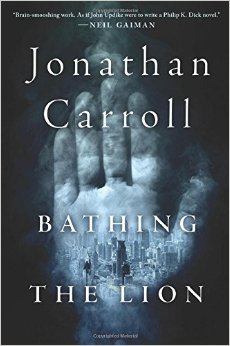 Jonathan Carroll’s latest novel, Bathing the Lion, opens with a relationship breakup. The breakup is described so vividly that the pain and tension is tangible and convincingly real. But this, along with the ultra-realistic scenes that follow, do not prepare the reader for what comes next.
Jonathan Carroll’s latest novel, Bathing the Lion, opens with a relationship breakup. The breakup is described so vividly that the pain and tension is tangible and convincingly real. But this, along with the ultra-realistic scenes that follow, do not prepare the reader for what comes next.
Picture a domestic-scale apocalypse with your world splitting beneath your feet in a way that feels both matter of fact and utterly bizarre.
So, what’s it about? Well, lots of things.
The story centres around five people who live in the same New England town. Some of them know each other; some don’t. They go to sleep one night and all share the same hyper-realistic dream.
When they wake the next day all of them know what has happened. All five were at one time “mechanics,” a type of cosmic repairman whose job is to keep order in the universe and clean up the messes made both by sentient beings and the terrifying Chaos that periodically rolls through, wreaking mayhem wherever it touches down. Because the job of a mechanic is grueling and exhausting, after a certain period all of them are retired and sent to different parts of the cosmos to live out their days as “civilians.” Their memories are wiped clean and new identities are created for them that fit the places they go to live out their natural lives to the end.
For the first time all retired mechanics are being brought back to duty: Chaos has a new plan, and it’s not looking good for mankind.
To describe this novel, as some have done, as “surrealistic” is to do it a disservice. By that I mean the word “surreal” suggests weirdness, obscurity, experimentalism. Whereas Carroll’s work is no such thing. The book is strange, yes, but the fantastical elements feel as real as today’s news. And it’s written in crystalline prose which induces in the reader a dreamlike state but with clear, uncompromising imagery and layers of meaning, if you choose to look for them.
Normally I find changing points of view within a single chapter an irritating, slightly lazy device, but in this case it’s completely justified. When you’re talking about a shared dream, or alternate reality, it is necessary to see it through the eyes of all the participants. For instance, are they all seing the same sentient couch? And the map on the hide of the red elephant, Mumba – none of these people can interpret it individually but perhaps collectively they can understand what it means.
Questioning the very nature of reality as it does, as well as exploring what it means to be human, places Bathing the Lion firmly in the camp that some might describe as “literature” with a capital “L”. And, make no mistake, Bathing the Lion is unquestionably a work of fine literature, and I don’t mean the reductive publishing category. It’s literature that deals with the human heart and spirit without being in the least pretentious or archly poetic.
At the core of Bathing the Lion is a kind of metaphysical adventure story which is every bit as gripping as a great space opera in far flung galaxies. At times it is also as disturbing as a horror story. And there is a leavening of humour, too, which makes the unsettling aspects even more unsettling.
But don’t look for an easily graspable storyline, or think you’re going to be let off the hook at the end. What you will be left with though is a sense of exhileration, a sense of having seen wonders, and plenty to think about and discuss afterwards.
With the year not finally out, I’d go as far as to say this is the best novel I have read in 2014. It will certainly remain in my mind for a long time.

















Kind words, greatly appreciated. Thank you.
Jonathan Carroll
Thank you for dropping by, Mr. Carroll. We also included this review in our podcast in episode 282. So, lots of people will hear or read the review.